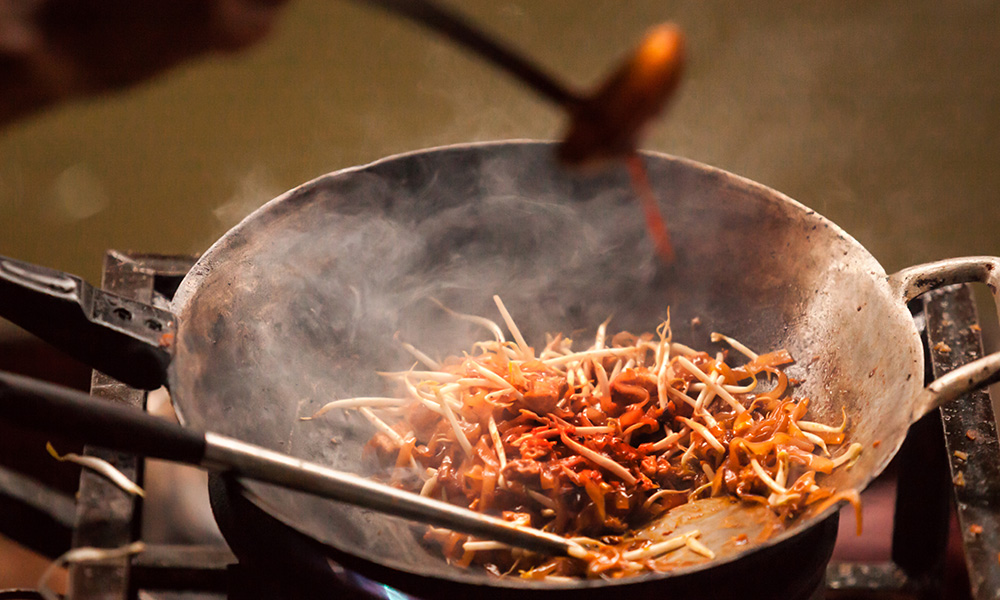How to Season a Wok with Wooden Handle: Unmissable Tips for Barbecue Enthusiasts
Written By James Morgan
If you're serious about barbecue and love the smokey flavors it brings, knowing how to season a wok with a wooden handle is a game-changer. This comprehensive guide will walk you through each step, ensuring your wok becomes an integral part of your outdoor cooking arsenal.

Why Seasoning Your Wok is Essential
Seasoning your wok is a crucial process that ensures its longevity and enhances its cooking capabilities. A well-seasoned wok not only provides a non-stick surface but also imbues your dishes with unique flavors. For barbecue enthusiasts, this allows for the perfect char and smokiness that elevate your cuisine.
The Benefits of a Wooden Handle
A wok with a wooden handle offers several advantages. Firstly, it provides a cool touch, allowing you to maneuver the wok without the risk of burns. Secondly, it lends a rustic charm that complements any outdoor setting. Learning how to season your wok by taking into account the wooden handle ensures you get the most out of its design and functionality.

Materials Needed for Seasoning
- A high-quality wok with a wooden handle
- Cooking oil (such as vegetable or canola oil)
- A scrubber or sponge
- Paper towels
- Stove or grill
Choosing the Right Oil
One of the first steps is to choose the right oil for seasoning. Oils with a high smoking point, such as vegetable, canola, and even peanut oil, work best. Avoid olive oil due to its low smoke point, which can result in a burnt and uneven seasoning layer.

Cleaning the Wok
Before you begin the seasoning process, it's essential to clean the wok thoroughly to remove any factory coatings or lubricants. You can read more about this process on our detailed article: Clean Wok Bottom.
Step-by-Step Cleaning Guide
- Use warm water and a sponge to scrub the wok inside and out.
- Rinse thoroughly and dry completely with paper towels.
- Place the wok on a stove or grill to evaporate any remaining moisture. This prepares your wok for the seasoning process.

Seasoning Your Wok
Step 1: Heating the Wok
Place the wok on a grill or stove and heat it until it starts to smoke slightly. This opens the metal's pores, allowing the oil to penetrate better.
Step 2: Applying the Oil
Using a paper towel dipped in oil, carefully wipe the entire inner surface of the wok. Ensure an even and thin layer to prevent pooling of oil.
Step 3: Smoking the Wok
Keep heating the wok until the oil starts to smoke. This indicates that the oil is breaking down and bonding with the metal, forming a protective layer. Turn off the heat and let the wok cool down.
Maintaining Your Seasoned Wok
Proper maintenance is essential to preserve the seasoning layer and prolong the life of your wok. After each use, clean your wok with warm water and a soft sponge. Avoid using soap to protect the seasoning layer. For more insights on maintaining your seasoned wok, check our guide on: Season Non-stick Wok.
Common Mistakes to Avoid
Even seasoned barbecue enthusiasts can make mistakes while seasoning their wok. Here are some common pitfalls to watch out for:
- Using soap after seasoning: This strips the protective layer.
- Applying too much oil: Leads to a sticky surface instead of a slick one.
- Skipping the cleaning step: Residual factory oils can contaminate your food.
Advanced Tips for Barbecue Enthusiasts
Using the Wok on a Grill
Take your barbecue game to the next level by using your seasoned wok directly on the grill. This method offers unparalleled heat distribution and imparts a unique smoked flavor to your dishes. For a detailed guide on preparing your wok, visit: Prepare a Wok.
Cooking Techniques
Experiment with various cooking techniques such as searing, stir-frying, and even smoking meats. A well-seasoned wok is versatile and can handle a range of cooking methods that amplify the barbecue experience.
Conclusion
Perfectly seasoning your wok with a wooden handle is a life-changing skill for any barbecue enthusiast. It not only enhances the flavor of your dishes but also extends the life of your cooking tools. By following these straightforward steps, you'll ensure that your wok is always ready for the next barbecue extravaganza.
FAQs
Q: How often should I season my wok?
A: It's recommended to season your wok every few months, depending on how frequently you use it.
Q: Can I use olive oil for seasoning?
A: No, olive oil has a low smoke point and can result in an uneven seasoning layer. Stick to oils with high smoke points like vegetable or canola oil.
Q: Is it okay to wash the wok with soap?
A: Avoid using soap as it can strip the seasoning layer. Rinse with warm water and a soft sponge for the best results.
As an Amazon Associate, I earn from qualifying purchases.



